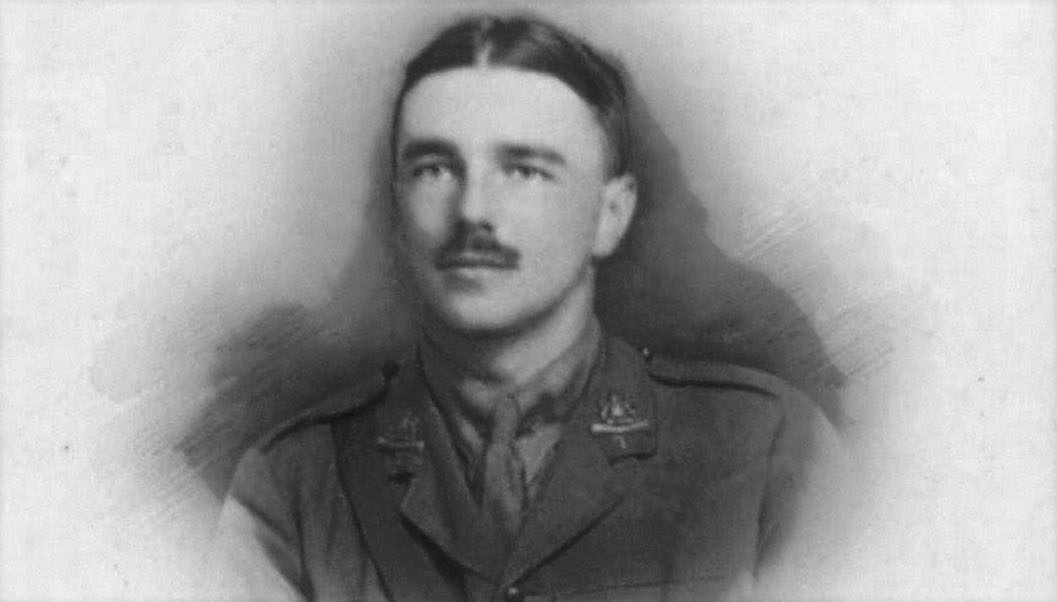
Biography
Wilfred Edward Salter Owen was born March 18th, 1893 to Thomas and Susan Owen. His father Thomas Owen was a seaman-turned-railroad-stationmaster and as a result the young Owen grew up in several different homes across Britain, moving for his father’s work throughout his childhood. He received the majority of his primary education at Birkenhead Institute and the Shrewsbury Technical School (now known as the Wakeman School). He graduated from Shrewsbury in 1911, aged 18.
Owen attempted at first to attend London University via scholarship, unable to afford tuition, but was rejected. In response, Owen took a position with the Church of England, working as a lay assistant to a vicar with the focus on serving the poor, sick, and disadvantaged members of the local congregation. The experience strengthened his humanist ideals, but permanently lowered the Church of England in his eyes for their lack of action on the issue. While Owen served as assistant to the vicar, Owen attended classes in botany and English at the University of Reading, some free at the instance of the head of the English department, and others paid as he was able.
In 1913, Owen traveled to France, teaching at the Berlitz School of Languages for one year, and then continuing until 1915 tutoring a Catholic family’s children. This time gave Owen a great appreciation for France and its people, and he was able to see with his own eyes how the war disrupted and destroyed the lives of the French. In September 1915 Owen returned to the United Kingdom. By October, he had enlisted and was placed in the Artists’ Rifles.
In June 1916, however, Wilfred Owen found himself receiving a commission as second lieutenant in Manchester Regiment. By December of that year, he was shipped out to France.
In his continual letters to his mother, Wilfred Owen’s tone is at first heroic and almost excited. It would not last. Immediately, his regiment was placed in trenches with two feet of standing water in the middle of winter. In a few days, he and his men would experience the full force of howitzers, machine gun fire, and poison gas, marching miles over shelled roads and flooded trenches and fighting the impossibly heavy mud for their lives.
On March 19th, just a little over two months after his arrival at the front, Owen was hospitalized for a brain concussion but quickly returned to the front. In April of 1917, the weather worsened leaving Owen and his men stuck in an open field in the snow under intense shelling, no support or relief troops, “kept alive on brandy, the fear of death, and the glorious prospect of the cathedral town just below us, glittering with the morning”.
Having miraculously survived the shellings of April, Owen was later diagnosed with shell shock and sent to Craiglockhart War Hospital in Edinburgh. It was here that Owen met the fellow WWI poet Siegfried Sassoon and begin their friendship. As a result of this, Owen began to devote his mind to his poetry, writing a great many of his most famous poems while a patient at Craiglockhart. Likewise, Sassoon’s anti-war sentiment was strongly shared by Owen, and their time together led them both to be become even more active in voicing their belief that the war should be ended immediately.
Following his release in 1918, Owen’s poetry began to become noticed and publishers voiced their interest. As he began to move forward in what looked to be fame and fortune in poetry, Owen found himself unwilling to sit by while the war continued. To the immense disagreement of Sassoon, Owen returned to the battlefields of France, willingly returning to the front line. In October, for his bravery leading his men in storming enemy strong points in Joncourt, Owen was awarded with the Military Cross. He had long sought it as justification for his war poetry, hoping its proof of his knowledge of war would help his countrymen listen to his anti-war message.
Wilfred Owen was killed on November 4th, 1918, exactly one week before the signing of the Armistice. He was killed in action, during the crossing of the Sambre-Oise Canal. His mother Susan, always a close friend and confidant of Owen, received notification of his death on Armistice Day. He was buried in Ors Communal Cemetery in France. His mother chose the following inscription for his tombstone, taken from his poem The End:
"SHALL LIFE RENEW THESE BODIES?
OF A TRUTH ALL DEATH WILL HE ANNUL"
W.O.
